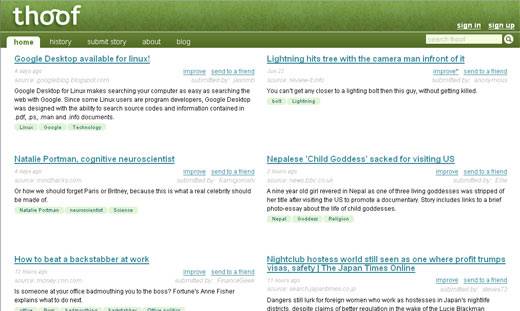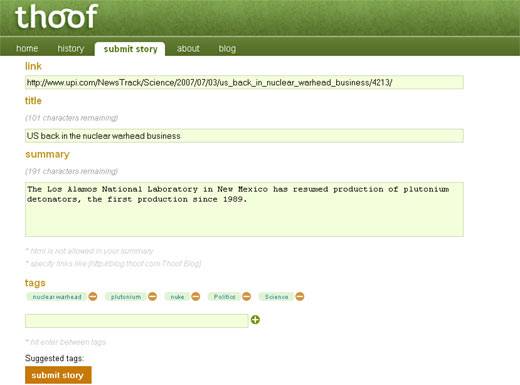Yesterday Richard opined that Digg could use some editors so that if someone submits a story with a nonsensical description or lame title it could be fixed instead of seeing a good story get buried. Thoof, which is a new link sharing and social news site, allows anyone to do just that: edit link titles and descriptions (or add new tags).

Thoof is a very new site, having only come out of a two week private beta at the end of June. Techcrunch reviewed it in mid-June. The site was founded by a handful of former Revver employees, including co-founder Ian Clarke, and the man behind the Apache Wicket web framework upon which Thoof is built.
Thoof is a unique link sharing site that really can’t be described in terms of others. It has no categories or voting like Digg, and while it has tags like del.icio.us, it isn’t quite a bookmarking site. Thoof relies on a story personalization algorithm to analyze the links you’ve clicked and attempts to deliver links based on your interests. Thoof gets a lot of things right, but there are also some flaws in the way the site operates, in my opinion.

What Thoof Gets Right
It really couldn’t be easier to get started with Thoof. The site doesn’t require that users sign up to use it, and lets anyone dive right in and submit or edit links. Signing up allows the site to begin tracking links you click so it can deliver stories it thinks you will enjoy. If you click on a story and later decide you don’t like it, you can click the “Not Interesting” link to erase it from Thoof’s memory. To edit a submission from someone else, click “Improve” and enter your changes and a reason why you think the title or description should be changed. Changes don’t go into effect until enough people vote for them (any Improve link with an asterisk * next to it has pending changes that need to be voted on). One gripe: voting on changes involves checking either “yes” or “no,” but there is no submit button and after voting nothing happens to indicate that your vote was recorded.
Though I said Thoof can’t really be compared to Digg, it’s inevitable that people will do just that since it is at least perceived as a competitor. One thing that always bothered me about Digg was that the main page is always the top technology links, and I really enjoy the politics and science sections as well (yes you can customize your page to track only certain topics, but that requires cutting categories, which isn’t a good solution). Getting a mix of links from multiple topic areas based on those I have previously enjoyed, however, is a great idea. It’s always difficult to tell if personalization algorithms like the one employed by Thoof really work. You can’t sit down and click on every link the site shows you to see if it’s really giving you links you care about, for example, since that would end up influencing the algorithm in unrealistic ways. But the idea is nonetheless an attractive one.

What Thoof Gets Wrong
There are a few things that I think Thoof gets wrong. One is that the site relies strictly on tags for categorization. Thoof encourages users when submitting links to use a mixture of broad tags (like “politics” or “technology”) and more specialized ones, but I think a set of predefined categories (which could still function as tags) would help a lot in organizing the site. One of the downsides of an automated algorithm is that eventually you are only fed links based on things you already like, rather than being able to stumble onto links in topicsyou never thought you liked. Pre-defined categories would facilitate browsing and make it easier for you to expand your horizons.
One of the things I like about Digg and del.icio.us and other social link sharing sites is that they keep track of links you like. Thoof’s “History,” unfortunately, only saves the links you’ve submitted, and not those you’ve clicked on. So it would seem that eventually links you liked will be lost to the ether — forcing you to use a separate bookmarking tool if you want to keep a record of them. Then again, Thoof seemed to keep suggesting the same stories to me, which was another minor annoyance.

Thoof also has no way to bury links. I saw a couple of instances of duplicate links being shown to me at the same time, as well as a few pieces of spam. With no way to bury or report this sort of thing, the site could quickly be taken over by opportunistic marketers.
Conclusion
I find myself really wanting to root for Thoof. It’s a little rough around the edges, but it has a novel approach to link sharing and social news that I find intriguing. It’s a bit like Digg meets Findory with a wiki flavor. Give Thoof a try and then tell us what you think in the comments below.










